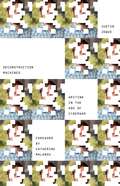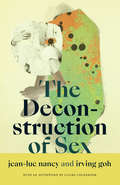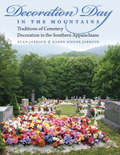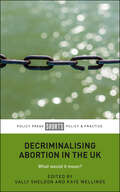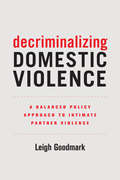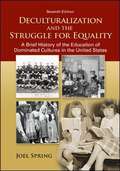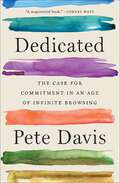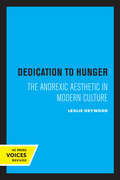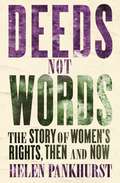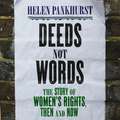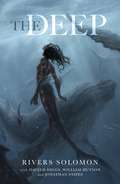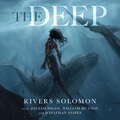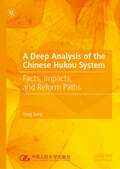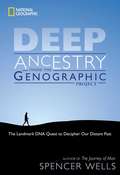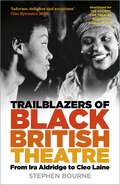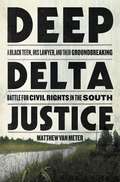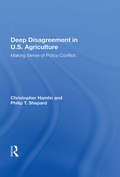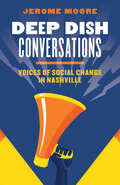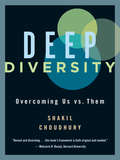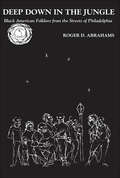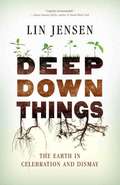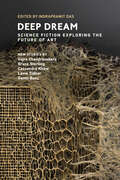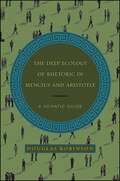- Table View
- List View
Deconstruction Machines: Writing in the Age of Cyberwar (Electronic Mediations #54)
by Justin JoqueA bold new theory of cyberwar argues that militarized hacking is best understood as a form of deconstruction From shadowy attempts to steal state secrets to the explosive destruction of Iranian centrifuges, cyberwar has been a vital part of statecraft for nearly thirty years. But although computer-based warfare has been with us for decades, it has changed dramatically since its emergence in the 1990s, and the pace of change is accelerating.In Deconstruction Machines, Justin Joque inquires into the fundamental nature of cyberwar through a detailed investigation of what happens at the crisis points when cybersecurity systems break down and reveal their internal contradictions. He concludes that cyberwar is best envisioned as a series of networks whose constantly shifting connections shape its very possibilities. He ultimately envisions cyberwar as a form of writing, advancing the innovative thesis that cyber attacks should be seen as a militarized form of deconstruction in which computer programs are systems that operate within the broader world of texts. Throughout, Joque addresses hot-button subjects such as technological social control and cyber-resistance entities like Anonymous and Wikileaks while also providing a rich, detailed history of cyberwar. Deconstruction Machines provides a necessary new interpretation of deconstruction and timely analysis of media, war, and technology.
The Deconstruction of Sex (a Cultural Politics book)
by Jean-Luc Nancy Irving GohIn The Deconstruction of Sex, Jean-Luc Nancy and Irving Goh discuss how a deconstructive approach to sex helps us negotiate discourses about sex and foster a better understanding of how sex complicates our everyday existence in the age of #MeToo. Throughout their conversation, Nancy and Goh engage with topics ranging from relation, penetration, and subjection to touch, erotics, and jouissance. They show how despite its entrenchment in social norms and centrality to our being-in-the-world, sex lacks a clearly defined essence. At the same time, they point to the potentiality of literature to inscribe the senses of sex. In so doing, Nancy and Goh prompt us to reconsider our relations with ourselves and others through sex in more sensitive, respectful, and humble ways without bracketing the troubling aspects of sex.
Decoration Day in the Mountains: Traditions of Cemetery Decoration in the Southern Appalachians
by Alan Jabbour Karen Singer JabbourDecoration Day is a late spring or summer tradition that involves cleaning a community cemetery, decorating it with flowers, holding a religious service in the cemetery, and having dinner on the ground. These commemorations seem to predate the post-Civil War celebrations that ultimately gave us our national Memorial Day. Little has been written about this tradition, but it is still observed widely throughout the Upland South, from North Carolina to the Ozarks. Written by internationally recognized folklorist Alan Jabbour and illustrated with more than a hundred photographs taken by Karen Singer Jabbour,Decoration Day in the Mountainsis an in-depth exploration of this little-known cultural tradition. The Jabbours illuminate the meanings behind the rituals and reveal how the tradition fostered a grassroots movement to hold the federal government to its promises about cemeteries left behind when families were removed to make way for Fontana Dam and Great Smoky Mountains National Park. Richly illustrated and vividly written,Decoration Day in the Mountainspresents a compelling account of a widespread and long-standing Southern cultural practice.
Decriminalising Abortion in the UK: What Would It Mean?
by Sally Sheldon and Kaye WellingsAvailable Open Access under CC-BY-NC licence. The public and parliamentary debate about UK abortion law reform is often diverted away from key moral and political questions by disputes regarding basic questions of fact. And all too often, claims of scientific ‘fact’ are ideologically driven. But what effect would decriminalisation be likely to have on women’s health? What would be the impact on the incidence of abortions? Would decriminalisation equate to deregulation, sweeping away necessary restrictions on dangerous or malicious conduct? With each chapter written by leading experts in the fields of medicine, law, reproductive health and social science, this book offers a concise and authoritative account of the evidence regarding the likely impact of decriminalisation of abortion in the UK.
Decriminalizing Domestic Violence: A Balanced Policy Approach to Intimate Partner Violence (Gender and Justice #7)
by Leigh GoodmarkDecriminalizing Domestic Violence asks the crucial, yet often overlooked, question of why and how the criminal legal system became the primary response to intimate partner violence in the United States. It introduces readers, both new and well versed in the subject, to the ways in which the criminal legal system harms rather than helps those who are subjected to abuse and violence in their homes and communities, and shares how it drives, rather than deters, intimate partner violence. The book examines how social, legal, and financial resources are diverted into a criminal legal apparatus that is often unable to deliver justice or safety to victims or to prevent intimate partner violence in the first place. Envisioned for both courses and research topics in domestic violence, family violence, gender and law, and sociology of law, the book challenges readers to understand intimate partner violence not solely, or even primarily, as a criminal law concern but as an economic, public health, community, and human rights problem. It also argues that only by viewing intimate partner violence through these lenses can we develop a balanced policy agenda for addressing it. At a moment when we are examining our national addiction to punishment, Decriminalizing Domestic Violence offers a thoughtful, pragmatic roadmap to real reform.
Deculturalization and the Struggle for Equality: A Brief History of the Education of Dominated Cultures in the United States
by Joel SpringDeculturalization and the Struggle for Equality is a brief history of school polices affecting dominated groups in the United States. In seven concise chapters, the text looks at the educational, legal, and social construction of race and racism, with a focus on educational practices related to deculturalization, segregation, and the civil rights movement.
Dedicated: The Case for Commitment in an Age of Infinite Browsing
by Pete DavisA profoundly inspiring and transformative argument that purposeful commitment and civic engagement can be a powerful force in today&’s age of restlessness and indecision.Most of us have had this experience: browsing through countless options on Netflix, unable to commit to watching any given movie—and losing so much time skimming reviews and considering trailers that it&’s too late to watch anything at all. In a book inspired by an idea first articulated in a viral commencement address, Pete Davis argues that this is the defining characteristic of the moment: keeping our options open. We are stuck in &“Infinite Browsing Mode&”—swiping through endless dating profiles without committing to a single partner, jumping from place to place searching for the next big thing, and refusing to make any decision that might close us off from an even better choice we imagine is just around the corner. This culture of restlessness and indecision, Davis argues, is causing tension in the lives of young people today: We want to keep our options open, and yet we yearn for the purpose, community, and depth that can only come from making deep commitments. In Dedicated, Davis examines this quagmire, as well as the counterculture of committers who have made it to the other side. He shares what we can learn from the &“long-haul heroes&” who courageously commit themselves to particular places, professions, and causes—who relinquish the false freedom of an open future in exchange for the deep fulfillment of true dedication. Weaving together examples from history, personal stories, and applied psychology, Davis&’s &“insightful without being preachy…guide to commitment should be on everyone&’s reading list&” (Booklist, starred review).
Dedication to Hunger: The Anorexic Aesthetic in Modern Culture
by Leslie HeywoodWriting as a competitive athlete, an academic, and a woman, Leslie Heywood merges personal history and scholarship to expose the "anorexic logic" that underlies Western high culture. She maneuvers deftly across the terrain of modern literature, illustrating how this logic—the privileging of mind over body, of hard over soft, of masculine over feminine—is at the heart of the modernist style. Her argument ranges from Plato to women's bodybuilding, from Franz Kafka to Nike ads. In penetrating examinations of Kafka, Pound, Eliot, William Carlos Williams, and Conrad, Heywood demonstrates how the anorexic aesthetic is embodied in high modernism. In a compelling chapter on Jean Rhys, Heywood portrays an author who struggles to develop a clean, spare, "anorexic" style in the midst of a shatteringly messy emotional life. As Heywood points out, students are trained in the aesthetic of high modernism, and academics are pressured into its straitjacket. The resulting complications are reflected in structures as diverse as gender identity formation, sexual harassment, and eating disorders. Direct, engaging, and intensely informed by the author's personal involvement with her subject, Dedication to Hunger offers a powerful challenge to cultural assumptions about language, gender, subjectivity, and identity. This title is part of UC Press's Voices Revived program, which commemorates University of California Press's mission to seek out and cultivate the brightest minds and give them voice, reach, and impact. Drawing on a backlist dating to 1893, Voices Revived makes high-quality, peer-reviewed scholarship accessible once again using print-on-demand technology. This title was originally published in 1996.
Deeds Not Words: The Story of Women's Rights - Then and Now
by Helen Pankhurst'An incredible book . . . Informative, enlightening, and with the potential to change women's lives.' Sandi Toksvig'A valuable guide and reference to anyone who wants to understand the Women's Movement in more depth. I am deeply grateful to Helen for writing it!' Annie Lennox OBEWhy is it taking so long? Despite huge progress since the suffragette campaigns and wave after wave of feminism, women are still fighting for equality. Why, at the present rate will we have to wait in Britain until 2069 for the gender pay gap to disappear? Why, in 2015, did 11% of women lose their jobs due to pregnancy discrimination? Why, globally, has 1 in 3 women experienced physical or sexual violence?In 2018, on the centenary of one of the greatest steps forward for women - the Fourth Reform Act, which saw propertied women over 30 gain the vote for the first time - suffragette descendant and campaigner Helen Pankhurst charts how the lives of women in the UK have changed over the last 100 years. She celebrates landmark successes, little-known victories, where progress has stalled or reversed, looking at politics, money, identity, violence, culture and social norms. The voices of both pioneers and ordinary women - in all their diversity - are woven into the analysis which ends with suggestions about how to better understand and strengthen feminist campaigning and with aims for the future.Combining historical insight with inspiring argument, Deeds not Words reveals how far women have come since the suffragettes, how far we still have to go, and how we might get there. It is essential reading for anyone who wants to explore one of the most central and pressing conversations of our time.
Deeds Not Words: The Story of Women's Rights - Then and Now
by Helen Pankhurst'An uplifting record of progress and strength... You'll lay the book down feeling not only informed, but galvanised to take action yourself.' Independent'An incredible book . . . with the potential to change women's lives.' Sandi ToksvigWhy is it taking so long? Despite huge progress since the suffragette campaigns and wave after wave of feminism, women are still fighting for equality.Why will we have to wait until 2069 for the gender pay gap to disappear in the UK? Why, in 2015, did 11% of women lose their jobs due to pregnancy discrimination? Why has 1 in 3 women in the world experienced physical or sexual violence? 'Engaging...part feminist history, part progress scoresheet and part family memoir.' Daily TelegraphIn Deeds Not Words suffragette descendant and activist Helen Pankhurst charts the changes in the lives of women over the last 100 years. She celebrates landmark successes and little-known victories, looking at politics, money, identity, violence, culture and social norms and turning to the voices of both pioneers and ordinary women for their perspective.'An exciting and engaging account of an essential part of British history.' Mary Evans, Emeritus Leverhulme Professor, London School of EconomicsCombining historical insight with inspiring argument, Deeds not Words reveals how far women have come, how far we still have to go, and how we might get there. It is essential reading for women - and men - on the most important issue of our time.'Deeds Not Words is so timely. A valuable guide and reference.' Annie Lennox OBE
Deeds Not Words: The Story of Women's Rights - Then and Now
by Helen PankhurstOn the 100th anniversary of women getting the vote, Helen Pankhurst - great-granddaughter of suffragette leader Emmeline Pankhurst and a leading women's rights campaigner - charts how women's lives have changed over the last century, and offers a powerful and positive argument for a new way forward.Why is it taking so long? Despite huge progress since the original suffragette campaigns and wave after wave of new feminism, women are still not equal. On the centenary of one of the greatest steps forward for women - the Vote - Suffragette descendent and campaigner Helen Pankhurst takes the reader on a journey exploring how women's lives have changed over the last 100 years, and how we can take things even further. Combining historical insight with inspiring argument, Deeds not Words to be essential reading for anyone who wants to know more about how far women have come since the Suffragettes, how far we still have to go, and how we will get there.(P)2018 Hodder & Stoughton Limited
The Deep
by Rivers Solomon Daveed Diggs William Hutson Jonathan SnipesWINNER OF THE LAMBDA LITERARY LGBTQ SCIENCE FICTION/FANTASY/HORROR AWARDThe water-breathing descendants of African slave women tossed overboard have built their own underwater society-and must reclaim the memories of their past to shape their future in this brilliantly imaginative novella inspired by the Hugo Award-nominated song "The Deep" from Daveed Diggs's rap group clipping.Yetu holds the memories for her people-water-dwelling descendants of pregnant African slave women thrown overboard by slave owners-who live idyllic lives in the deep. Their past, too traumatic to be remembered regularly, is forgotten by everyone, save one-the historian. This demanding role has been bestowed on Yetu.Yetu remembers for everyone, and the memories, painful and wonderful, traumatic and terrible and miraculous, are destroying her. And so, she flees to the surface, escaping the memories, the expectations, and the responsibilities-and discovers a world her people left behind long ago.Yetu will learn more than she ever expected to about her own past-and about the future of her people. If they are all to survive, they'll need to reclaim the memories, reclaim their identity-and own who they really are.Inspired by a song produced by the rap group Clipping for the This American Life episode "We Are In The Future," The Deep is vividly original and uniquely affecting.
The Deep
by Rivers Solomon Daveed Diggs William Hutson Jonathan SnipesThe water-breathing descendants of African slave women tossed overboard have built their own underwater society-and must reclaim the memories of their past to shape their future in this brilliantly imaginative novella inspired by the Hugo Award-nominated song "The Deep" from Daveed Diggs's rap group clipping.Yetu holds the memories for her people-water-dwelling descendants of pregnant African slave women thrown overboard by slave owners-who live idyllic lives in the deep. Their past, too traumatic to be remembered regularly, is forgotten by everyone, save one-the historian. This demanding role has been bestowed on Yetu.Yetu remembers for everyone, and the memories, painful and wonderful, traumatic and terrible and miraculous, are destroying her. And so, she flees to the surface, escaping the memories, the expectations, and the responsibilities-and discovers a world her people left behind long ago.Yetu will learn more than she ever expected to about her own past-and about the future of her people. If they are all to survive, they'll need to reclaim the memories, reclaim their identity-and own who they really are.Inspired by a song produced by the rap group Clipping for the This American Life episode "We Are In The Future," The Deep is vividly original and uniquely affecting.(P) 2019 Simon & Schuster Audio
A Deep Analysis of the Chinese Hukou System: Facts, Impacts, and Reform Paths
by Yang SongThis book explores China's hukou system, by which individuals are registered in a specific geographic region, and the prospects for reform. The history of the hukou system and its instrumental role in Chinese urbanization and labor markets is explained, and readers get a sense of what issues are prioritized by Chinese policymakers as they contemplate reform or change to this system, from hukou-based labor market discrimination, inequality of opportunity, multi-dimensional poverty of rural migrants, the public health consequences of non-hukou migration, and old age insurance for migrants without hukous. The author concludes with a stirring and practical call for hukou reform, articulating a cost-benefit model and providing an array of policy suggestions. This book will interest scholars of Chinese society, demographics and future urbanization.
Deep Ancestry: The Landmark DNA Quest to Decipher Our Distant Past
by Spencer WellsIn Deep Ancestry, scientist and explorer Spencer Wells shows how tiny genetic changes add up over time into a fascinating story. Using scores of real-life examples, helpful analogies, and detailed diagrams and illustrations, he translates complicated concepts into accessible language and explains exactly how each and every individual's DNA contributes another piece to the jigsaw puzzle of human history. The book takes readers inside the Genographic Project, the landmark study now assembling the world's largest collection of population genetic DNA samples and employing the latest in testing technology and computer analysis to examine hundreds of thousands of genetic profiles from all over the globe. Traveling backward through time from today's scattered billions to the handful of early humans who are ancestors to us all, Deep Ancestry shows how universal our human heritage really is. It combines sophisticated science with our compelling interest in family history and ethnic identity, and transcends humankind's shallow distinctions and superficial differences to touch the depths of our common origins.
Deep Ancestry: Inside the Genographic Project
by Spencer WellsLaunched in 2005, the Genographic Project is the largest genetic study of human migration ever mounted. In this accessible text, Project Director and National Geographic Explorer-in-Residence Spencer Wells provides an overview of what is understood so far and describes what scientists hope to learn as the project progresses. He uses the stories of five individual program participants as examples for explaining how historical details are gleaned from DNA and exploring the larger issues involved in the research. Annotation ©2007 Book News, Inc., Portland, OR (booknews.com)
Deep Are the Roots: Trailblazers Who Changed Black British Theatre
by Stephen Bourne'Stephen Bourne is a hero of our history' Booker Prize-winner Bernardine Evaristo 'I love Stephen's books because he gives voice to real people' Jhalak Prize-winner Patrice LawrenceIn Deep Are the Roots, Stephen Bourne celebrates the pioneers of Black British theatre, beginning in 1825, when Ira Aldridge made history as the first Black actor to play Shakespeare’s Othello in the United Kingdom, and ending in 1975 with the success of Britain’s first Black-led theatre company.In addition to providing a long-overdue critique of Laurence Olivier’s Othello, too-often cited as the zenith of the role, Bourne has unearthed the forgotten story of Paul Molyneaux, a Shakespearean actor of the Victorian era. The twentieth-century trailblazers include Paul Robeson, Florence Mills, Elisabeth Welch, Buddy Bradley, Gordon Heath, Edric Connor and Pearl Connor-Mogotsi, all of them active in Great Britain, though some first found fame in the United States or the Caribbean. Then there are the groundbreaking works of playwrights Barry Reckord and Errol John at the Royal Court; the first Black drama school students; pioneering theatre companies; and three influential dramatists of the 1970s: Mustapha Matura, Michael Abbensetts and Alfred Fagon.Drawing on original research and interviews with leading lights, Deep Are the Roots is a powerful study of theatre’s Black trailblazers and their profound influence on British culture today.
Deep Delta Justice: A Black Teen, His Lawyer, and Their Groundbreaking Battle for Civil Rights in the South
by Matthew Van MeterThe "arresting, astonishing history" of one lawyer and his defendant who together achieved a "civil rights milestone" (Justin Driver). In 1966 in a small town in Louisiana, a 19-year-old black man named Gary Duncan pulled his car off the road to stop a fight. Duncan was arrested a few minutes later for the crime of putting his hand on the arm of a white child. Rather than accepting his fate, Duncan found Richard Sobol, a brilliant, 29-year-old lawyer from New York who was the only white attorney at "the most radical law firm" in New Orleans. Against them stood one of the most powerful white supremacists in the South, a man called simply "The Judge." In this powerful work of character-driven history, journalist Matthew Van Meter vividly brings alive how a seemingly minor incident brought massive, systemic change to the criminal justice system. Using first-person interviews, in-depth research and a deep knowledge of the law, Van Meter shows how Gary Duncan's insistence on seeking justice empowered generations of defendants-disproportionately poor and black-to demand fair trials. Duncan v. Louisiana changed American law, but first it changed the lives of those who litigated it.
Deep Disagreement In U.s. Agriculture: Making Sense Of Policy Conflict
by Christopher HamlinThis book exemplifies disagreements in agricultural research and agricultural policies in the U.S. It hopes to expand the capacity for critical discussion on matters of agriculture and attempts to open a path to more fruitful communication among participants in agricultural controversy.
Deep Dish Conversations: Voices of Social Change in Nashville
by Jerome MooreWhat does it mean to be a Nashvillian? A Black Nashvillian? A white Nashvillian? What does it mean to be an organizer, an ally, an elected official, an agent for change? Deep Dish Conversations began as a running online interview series in which host Jerome Moore sits down over pizza with Nashville leaders and community members to talk about the past, present, and future of the city and what it means to live here. The result is honest conversation about racism, housing, policing, poverty, and more in a safe, brave, person-to-person environment that allows for disagreement. This book is a curated collection of the most striking interviews from the first few seasons of the series, with a foreword by Dr. Sekou Franklin, an introduction by Moore, and contextual introductions to each interviewee. Figures like Judge Sheila Calloway, comedian Josh Black, anti-racism speaker Tim Wise, organizer Jorge Salles Diaz, and many more explore their wide-ranging perspectives on social change in a city in the midst of massive demographic and ideological shifts. For anyone in any twenty-first-century city, Deep Dish Conversations offers a lot to think about—and a lot of ways to think about it.
Deep Diversity: Overcoming Us vs. Them
by Shakil ChoudhuryWhat if our interactions with those different from us are strongly influenced by things happening below the radar of awareness, hidden even from ourselves? Deep Diversity explores this question and argues that "us vs. them" is an unfortunate but normal part of the human experience due to reasons of both nature and nurture.To really work through issues of racial difference and foster greater levels of fairness and inclusion, argues Shakil Choudhury, requires an understanding of the human mind—its conscious and unconscious dimensions. Deep Diversity integrates Choudhury’s twenty years of experience with interviews with researchers in social neuroscience, implicit bias, psychology, and mindfulness. Using a compassionate but challenging approach, Choudhury helps readers identify their own bias and offers practical ways to break the "prejudice habits" we have all learned, in order to tackle systemic discrimination.
Deep Down in the Jungle...: Negro Narrative Folklore From The Streets Of Philadelphia
by Roger D. AbrahamsWith the growth of interest in folklore, it becomes increasingly evident that the presentation of a collection needs some rationale more than the fact that traditional materials have been collected and properly annotated. Much has been gathered and is now accessible through journals, archives, and lists. If a corpus of lore is not presented in some way, which bears new light on the process of word-of-mouth transmission, on traditional forms or expressions, or on the group among whom the lore was encountered, there is little reason to present it to the public. This work represents an attempt to present a body of folklore collected among one small group of Black Americans in a neighborhood in South Philadelphia. The author's approach toward collection and presentation has been intensive. He has tried to collect "in depth," and to recreate in his presentation the social background in which the lore was found, and to relate the lore with the life and the values of the group. Abraham's work is a departure from any past methods of analyzing folklore, and therefore a description of the author's point of view and his method will be given first. The majority of this work was written before his methodology was actually formulated. However throughout the project û the object was to illuminate as fully as possible the lore of one small group of African Americans from urban Philadelphia. The methodology, which developed, did so because of this objective more than anything else. Though the formulation of this theory may seem ex post facto, it is included because it clarified much during the rewritings of this book, and more importantly, because it will clarify many matters for the lay reader and for the professional folklorist.
Deep Down Things
by Lin JensenBeloved and critically acclaimed author Lin Jensen returns with this bounteous volume exploring what the poet Gerard Manley Hopkins calls "deep down things." Richly informed by deep ecology, Lin's writing explores our intimate connection to the land, to the specificities of place, and to the living earth itself-all as Lin uncovers our own deepest nature, the true heart of what it means to be human. There is much in what's happening in our environment now that can and perhaps should be cause for dismay - and Deep Down Things looks squarely at all of this and nonetheless gives us ample cause for celebration.
Deep Dream: Science Fiction Exploring the Future of Art (Twelve Tomorrows)
by Indrapramit DasTen acclaimed writers imagine the future of art across space and time.In this volume from the Twelve Tomorrows series, Deep Dream, ten writers imagine the different ways in which art forms might evolve, devolve, shift, and transform in the decades and centuries to come. They consider how the rapid progress of technology will interact with different mediums of art or give rise to new ones, and what the lives and inner worlds of different kinds of artists might look like in the future as they adapt to rapidly shifting eras amidst anthropogenic global threats like climate change and fascism. Contributors include award-winning authors and artists from around the world, with a strong focus on South Asia; three of the contributors are from India or Sri Lanka. Readers will also find in this collection American science-fiction legend Bruce Sterling and Egyptian counter-cultural cartoonist, visual artist, and writer Ganzeer, as well as artist Diana Scherer, one of the pioneers in bio tech art. The volume also includes an interview with noted science fiction publisher and editor Neil Clarke, who discusses the future of art and the ways in which the science fiction short fiction market has responded to the introduction of AI-generated fiction and art.ContributorsSamit Basu, Vajra Chandrasekera, Neil Clarke, Aliette de Bodard, Ganzeer, Cassandra Khaw, Lavanya Lakshminarayan, Archita Mittra, Sloane Leong, Bruce Sterling, Wole Talabi, Lavie Tidhar. Artwork by Diana Scherer.
The Deep Ecology of Rhetoric in Mencius and Aristotle: A Somatic Guide (SUNY series in Chinese Philosophy and Culture)
by Douglas RobinsonMencius (385–303/302 BCE) and Aristotle (384–322 BCE) were contemporaries, but are often understood to represent opposite ends of the philosophical spectrum. Mencius is associated with the ecological, emergent, flowing, and connected; Artistotle with the rational, static, abstract, and binary. Douglas Robinson argues that in their conceptions of rhetoric, at least, Mencius and Aristotle are much more similar than different: both are powerfully socio-ecological, espousing and exploring collectivist thinking about the circulation of energy and social value through groups. The agent performing the actions of pistis, "persuading-and-being-persuaded," in Aristotle and zhi, "governing-and-being-governed," in Mencius is, Robinson demonstrates, not so much the rhetor as an individual as it is the whole group. Robinson tracks this collectivistic thinking through a series of comparative considerations using a theory that draws impetus from Arne Naess's "ecosophical" deep ecology and from work on rhetoric powered by affective ecologies, but with details of the theory drawn equally from Mencius and Aristotle.
